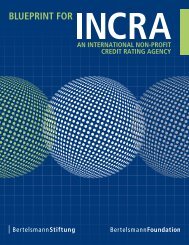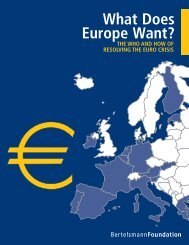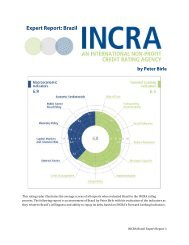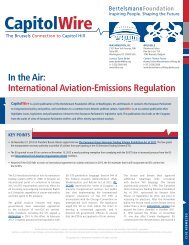as a rising regional and internationalpower whose influence would be goodfor Europe in general and Britain inparticular. One of David Cameron’sfirst overseas trips as prime ministerwas to Ankara, where he signed astrategic partnership agreement withErdogan outlining joint commitmentson bilateral, regional and internationalissues. 17 In 2011, Cameron and Erdoganalso established the Tatli Dil forum,bringing together individuals from thepolitical, business and academic sectorsin both countries. Cameron has criticizedthe EU for the slow pace of accessionnegotiations. While sidesteppingbroader concerns over governance andinternal cohesion, Cameron has arguedthat Turkish membership in the EUwould increase the union’s internationalinfluence and have profound economic,security and diplomatic benefits. 18Unlike the UK, France’s relations withTurkey have become frosty, if nothostile, over the last four years. Thisdeterioration resulted in large part fromthe policies of former president NicolasSarkozy, who was staunchly opposedto Turkish membership in the EU. Heblocked the opening of five criticalchapters of Turkey’s EU agenda at theEuropean Council’s 2007 accessiontalks, a blockade that remains in place.Domestically, Sarkozy angered Turkishofficials with his enthusiastic support ofa 2011 French parliamentary bill makingit a crime to deny the 1915 Armeniangenocide. In retaliation, Erdogan frozerelations, recalling its ambassadorand denying French airplanes accessto Turkish airspace, including militaryplanes bound for Afghanistan. 19The striking down of the genocide billby the French Constitutional Court andthe recent election of François Hollandeas president helped lessen the tensionbetween Ankara and Paris. Full diplomaticrelations have been restored, and theTurkish government has expressedconfidence that Hollande will lift Frenchobjections to EU membership and moveforward on the blocked chapters. ButHollande has been coy on the subject,describing himself as “non-reluctant” tosupport Turkish membership if Ankaracompleted all of the necessary accessioncriteria. 20 At the same time, though,he strongly supported the genocidebill, and his warm relations with theArmenian community in France and hissupport for an amended law in lightof the court’s decision raise doubtsover whether Paris’s position towardsTurkey will significantly improve in thecoming years.Turkey’s relationship with Germanyremains the most complex among itsbilateral ties on the European continent.The countries have maintained uniquepolitical, economic and cultural relationsfor decades, and their economies are stilldeeply interdependent. German exportsto Turkey have risen 400 percent over thelast 10 years, amounting to $20.1 billionin 2011. 21 Likewise, Germany has emergedas one of Turkey’s most importanttrading partners. The 50th anniversarycelebration of Germany’s guest workerprogram in 2011 highlighted the uniquecultural connection established by themore than 3 million Turkish immigrantsand people of Turkish descent livingin Germany.Roadblocks on Turkey’s Path to EU AccessionChapter openings blocked by the CouncilEight: Free movement of goods; freedom to provide services; financialservices; agriculture and rural development; fisheries; transport policies;customs union; external relationsChapters opened for negotiations, but closureblocked by the CouncilChapter openings blocked by FranceTwelve: Free movement of capital; company law; intellectual propertylaw; information society and media; food safety; veterinary andphytosanitary; taxation; statistics; enterprise and industrial policy, trans-European networks; environment; consumer and health protection;financial controlFive: Agriculture and rural development*; economic and monetarypolicy; regional policy; financial and budgetary provisions; institutionsChapter openings blocked by CyprusSix: Free movement of workers; energy; judiciary and fundamentalrights; justice, freedom and security; education and culture; foreign,security and defense policyNo movementSuccessfully completed chaptersFive: Public procurement, competition policy; social policy andemployment; institutions; other issuesOne: science and research*The agriculture and rural development chapter is also blocked by the EU CouncilSource: House of Commons Foreign Affairs Committee. (20 March, 2012). UK-Turkey Relations and Turkey’s Regional Role: Twelfth Report of Session 2010-2012.5 8Turkey
Yet despite these close connections, therelationship between German ChancellorAngela Merkel and Erdogan is lukewarmat best. Erdogan has repeatedlycriticized Berlin for poor treatment of theTurkish minority and angered Germanofficials by calling for ethnic Turks to“integrate, but not assimilate” intoGerman society. 22 For her part, Merkelhas continued to resist calls for Turkishmembership in the EU, preferring a“privileged partnership” status forAnkara. The future of this position mayhinge on next year’s national elections,as Germany’s Social Democratic Party(SPD) has been far more bullish than theCDU on EU membership for Turkey.Ankara’s uneven relationship withEurope’s major players has naturallytranslated into equally complex tieswith the EU. Beyond its large traderelationship, EU-Turkey engagementscontinue to revolve largely around themembership process. As of 2012, onlyone of the 35 chapters of the acquiscommunautaire has been successfullynegotiated (science and technology).Only 12 other chapters have beenopened, and their closure and theopening of the remaining 21 chaptershave been blocked by Cyprus, France,Germany and the European Councilas a whole. Resolution of the Cyprusquestion remains a key precondition,but little movement has taken placesince the failed 2004 peace plan ledby Kofi Annan. Cyprus has vetoed sixchapters, while the Council has frozen anadditional eight because Turkey refusedto open its ports to Cypriot shippingas required by the EU-Turkey CustomsUnion agreement. 23Yet the lack of movement on EUmembership has also raised alarmsamong Turkey’s supporters that theEU is “losing Turkey”, especially as itsforeign policy becomes increasinglyindependent of Brussels and publicsupport for membership declines.During a bilateral visit to Berlin inOctober 2012, Erdogan went so far as tosay that the EU would lose his countrypermanently if Turkey wasn’t made amember by 2023, the 100th anniversaryof the Turkish state. 24 Eleven EU foreignministers signed an op-ed in late 2011calling for the EU to make a renewedpush toward membership for Turkey. 25The European Commission has alsosought to inject new momentum bypushing the “Positive Agenda”, a seriesof working groups that will seek to speedup Ankara’s compliance with the acquison 8 chapters. 26 While not replacingthe accession process, the PositiveAgenda is viewed as a complementarytool to increase Ankara’s ability toclose chapters should objections by EUmember states ever be lifted.Relations between NATO and Turkeyhave remained stable, if ambiguous. Thestalled EU membership negotiations andthe Cyprus question stand in the way ofa deeper NATO-EU strategic relationshipand fuller implementation of the BerlinPlus Agreement. Nonetheless, Turkey forthe most part has adopted a commonline with the EU’s NATO members onkey flashpoints, particularly missiledefense and the ongoing Syrian conflict.Ankara has sought alliance solidarityagainst potential attacks by Syrianforces, requesting the placement ofPatriot missile batteries on its territoryand considering invoking Article 5 iftensions with Damascus escalated anyfurther. European NATO states haveexpressed solidarity with Turkey, withGerman Defense Minister Thomas deMaiziere suggesting that the deploymentof Patriot missiles would be done “withGerman soldiers”. 27 However, Europeancapitals, particularly Berlin, still remainconcerned over a potential Turkish-Syria war that could engulf the alliance,and have quietly pressured Ankarato limit the size and scope of NATOmilitary requests. 28Recommendations for 2013As the situation in Syria continuesto unravel and as post-revolutionaryconditions in other states (particularlyEgypt) remain unclear, Turkey willremain an important actor in the regionand a key partner for the next U.S.administration. Yet maximizing thebenefits of this partnership will requirea foreign policy strategy that addressesthe complex and in many cases interconnectedissues that hamper closerYet the lack of movementon EU membership hasalso raised alarms amongTurkey’s supporters thatthe EU is “losing Turkey”,especially as its foreignpolicy becomes increasinglyindependent of Brusselsand public support formembership declines.partnership with the US and greateracculturation with its European allies.1. Encourage Turkey torenew efforts to solve the“Kurdish question”:The next US administration, andits European counterparts, shouldencourage the AKP government tocontinue down the path of inclusion andopenness towards its Kurdish minority.The Erdogan government initially brokefrom its predecessors by recognizing thatthe Kurdish question requires a politicalsolution rather than a military one, andinitiated a number of overtures towardsthe Kurdish community, including mostrecently the 2009 “Kurdish Opening”,which granted unofficial amnesty to asmall number of PKK militants. Despitethese small concessions, however,progress has mostly been fleeting. Publicopposition led little weight to be thrownbehind the Kurdish Opening, and theSyrian war has complicated the conflict,prompting Erdogan to largely abandonpolitical options in favor of a militarysolution once again. This approachalso raises concerns over Turkey’s hardwondemocratic consolidations. Thegovernment has grown increasinglyauthoritarian as it attempts to dealwith the problem, suppressing freedomof expression and jailing journalistscovering Kurdish issues deemedoffensive to the government. 29The US recognizes the PKK as aterrorist organization and shouldcontinue to provide military andintelligence assistance to Turkey asPKK attacks escalate. Nonetheless,Turkey5 9
- Page 3:
Field Manual to EuropeIntroduction
- Page 6:
multilateral channels. Europeanshav
- Page 9 and 10: JuneBritish presidency of UNSCJune
- Page 12 and 13: US-EU Investment vs. Global Nationa
- Page 14 and 15: economic conditions in the eurozone
- Page 17 and 18: MEMO ONTHE EUROZONE CRISISThe State
- Page 19 and 20: attitude toward moral hazard. Withw
- Page 21 and 22: Greece: 2010 Bailout BreakdownGreec
- Page 23 and 24: the deficit from 4.5 percent to thr
- Page 27 and 28: NATO thus faces an uncertain future
- Page 29 and 30: 1. Consider NATO’s defensespendin
- Page 31 and 32: of-area operations and worldwidepar
- Page 33 and 34: concurrent terrorist attack in Beng
- Page 35: 2. Strengthen regionalpartnerships
- Page 38 and 39: MEMO ONCOUNTERTERRORISM ANDHOMELAND
- Page 40 and 41: home affairs (JHA), particularly in
- Page 43 and 44: Status of EU Countries in the US Vi
- Page 45 and 46: offensive capability centered at NA
- Page 47 and 48: socialized, i.e. there is a tacit e
- Page 49 and 50: such technology, such as deep packe
- Page 51 and 52: MEMO ONENERGY & CLIMATE CHANGEThe S
- Page 54 and 55: identifying the agents most qualifi
- Page 56 and 57: MEMO ONTURKEYThe State of PlayTurke
- Page 60 and 61: CASE STUDY: TURKEY’S ENERGY ROLE:
- Page 62 and 63: 22%12%Turkey’s Main Trading Partn
- Page 64 and 65: MEMO ONRUSSIAThe State of PlayIn Pr
- Page 66 and 67: EU-Russia security apparatus. Themo
- Page 68 and 69: greater market access for US busine
- Page 70 and 71: MEMO ONCHINAThe State of PlayIn 201
- Page 72 and 73: But China’s competitive meridian
- Page 74 and 75: in millions of USDUS-China Bilatera
- Page 76 and 77: 7 6Acknowledgements
- Page 78 and 79: CITATIONSINTRODUCTION1See “Confid
- Page 80 and 81: 20Castle, S. (17 September, 2011).
- Page 82 and 83: ARAB UPRISING1Koch, C. (summer 2011
- Page 84 and 85: COUNTERTERRORISM & HOMELAND SECURIT
- Page 86 and 87: 21Healey, J. (January 2012). Beyond
- Page 88 and 89: 20Berlemont, I. (25 July, 2012). Fr
- Page 90 and 91: 24Putin, V. (6 September, 2012). An
- Page 92: Bertelsmann Foundation1101 New York






